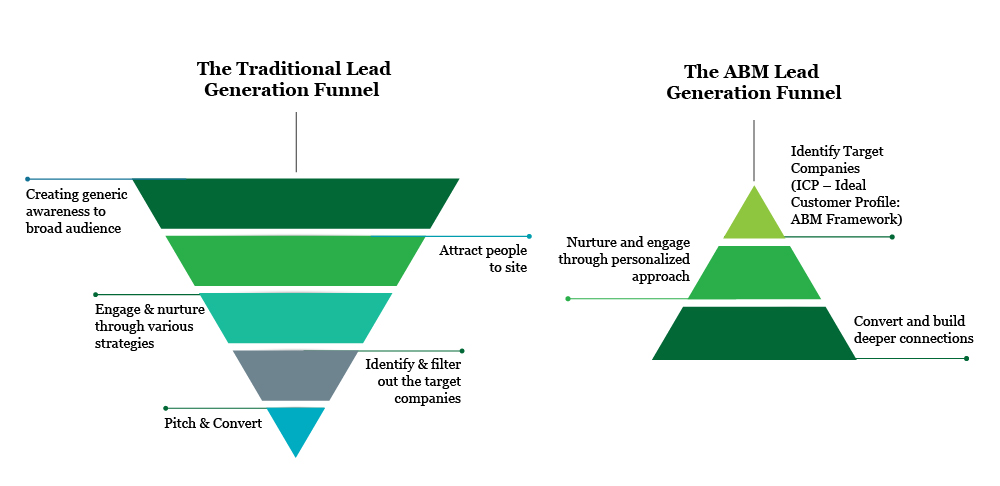What is Account-Based Marketing (ABM)?
In simple terms, ABM refers to marketing and engaging your products to selected accounts that you think are potential prospects. These are high-value accounts or companies that have the potential and high possibilities to show interest in your product/services.
Now, instead of making a random sales and pitching checklist, you as a business will engage these “interested or best-fit” clients with a personalized and targeted marketing approach.
ABM is the collaboration of the marketing and sales department that filters out specific accounts to channel their tailored marketing and sales effort.
So, we have understood that sales and marketing teams are equally responsible for recognizing and targeting high-value accounts. But how do we know that an account is best-fit and has the highest potential revenue for your business?
Account-Based Marketing Framework
ABM is one such strategy that plays a major role in B2B lead generation. B2B marketers and sales teams together create an ideal customer profile (ICP) based on the business goals and analyze how their product/service can effectively address the pain points of other targeted business profiles better than the competitors.
The ABM framework might depend on one business to the other, the type of product/service, and their expansion and revenue goals. Below are some of the common traits that b2b marketers and sales teams consider to be the right factors for ABM framework:
- Compatibility of business objectives
- Scalability of account in the future
- Revenue generation
- How the business USPs can bring a change to customer’s businesses?
- The level of personalization to be implemented in target accounts
- The resources and time needs to be spent on each target account
Benefits of Account-Based Marketing

-
Higher Conversion Rates
The nature of ABM is targeting and personalization. By creating the ABM framework through the process of identifying key accounts, you as a business have already gained access to valuable customer profiles.
ABM involves building relationships with key decision-makers within the target accounts. By using various personalized approaches through content, interactions, and engagement strategies, ABM deepens the engagement with target accounts and builds trust, thus resulting in improved conversion rates.
-
Increase in ROI
There is no room for guesswork and preparing a huge pitch list based on approximation. ABM helps you to lead to the sale funnel only after analyzing that the demands of the customer businesses can be fulfilled by your product/service. This targeted approach leads to the closing of leads in turn increased ROI.
-
Addressing Customer Pain Points through a Personalized Approach
The nature of the ABM framework is to provide a personalized approach to target accounts. The main criterion while finalizing these target accounts is how well the product/service of a business can address the problem of other businesses effectively.
So, the process of understanding the pain points of potential customers is already done by the sales and marketing team at the first stage of finalizing the best-fit accounts. The ABM approach addresses the problem of customers, calculates the compatibility, and provides a personalized approach to each of the target accounts leading to conversion of customers.
-
Leads to Shorter Sales Cycles
The major benefit of the ABM approach is that it helps you to understand who the potential customer is at the very early stage of research leading to a shorter sales cycle, effective utilization of resources, and early conversion of a potential prospect.

How Account-Based Marketing is Effective in B2B leads generation

-
Focus on High-value Clients
ABM narrows down the focus to target accounts that are most likely to convert into customers. ABM identifies high-value accounts and helps businesses to allocate their efforts and resources effectively without any wastage. This personalized nurturing of best-fit clients drives more conversions than any other mass marketing approach.
-
Account-specific Marketing Strategies
ABM framework helps businesses to create strategies for each of the target accounts based on the objectives, pain points, benefits, etc. Businesses can customize their marketing campaigns, offers, and interactions as per the unique needs of target accounts.
-
ABM Effectively Leverages Multichannel Approach
Account-based marketing leverages a multi-channel approach to connect to customers at various convenient touch points. The multichannel approach can include personalized emails, the use of various social media platforms, content marketing, targeted advertising, customized campaigns, etc.
-
Measuring and Optimization of Marketing Strategies
Gone are the days of using unconventional mass marketing investments of resources and time. With account-based marketing in lead generation, businesses can estimate the revenue spent for each of the accounts and plan the expenses and resources as per their budget.
Also, marketers can track and measure engagement levels, conversion rates, and revenue generated from target accounts.
Conclusion

Account-Based Marketing is the proven method to generate quality leads without wasting time and resources. It not only brings higher conversions and ROI but is also helpful in building long-lasting customer relationships and providing enhanced customer experience in a very short span compared to traditional marketing approaches.
Also read: Getting Your Prospects to Become Your Valued Clients



